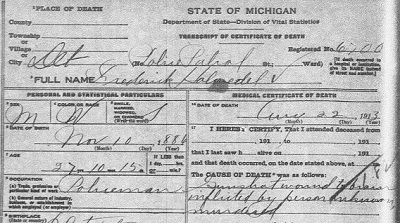
Often those doing their genealogy don't want to take the time or spend the money to obtain a death certificate for their ancestor. Perhaps they have already found the gravestone online or have found the death date in an online index and it doesn't seem important. However, death certificates can contain many helpful tidbits about your ancestors.
A death certificate can have this information:
Keep in mind also that the accuracy of the information on a death certificate depends upon the knowledge of the informant or person giving the information for the certificate.
You will want to look to see who the informant was and analyze how well they knew the deceased person. If they are a son or daughter, then most likely the information is going to be accurate but if it's a distant relative, it may not be as correct or could be partially correct. In all cases, the information regarding the death is usually accurate but any of the other details may or may not be completely accurate, depending on the knowledge of the informant.
A death certificate can be particularly helpful for situations such as:
If you are trying to learn more about your mystery ancestor, it can be helpful to locate a death certificate for each of their children to learn clues about their parents. For example, you can see what the death certificate of their children says about where they were born. You can also see the specific place where a person's children were born to better pin down where the parents were living at the time of the births of their children. You may also be able to find out the mother's maiden name on the death certificates of her children.
Death certificates are generally held by the state Department of Health, though each state has different laws regarding death certicates. Some states started keeping death certificates earlier than others, though all states have them from the 1920s and later. For states and years, death certificates can even be located online.
You can locate death certificates that are available online by using our records directory for death records. If death certificates were not being recorded at the time of death of your ancestor, then you could try looking for church records.
The FamilySearch wiki has details about which states recorded death certificates for which years.
If you are looking for a death certificate for a recent death, a Google search for the state name plus death certificate, such as "New York death certificates" can also help you track down which government entity holds copies of the certificates.
Need help finding more records? We have genealogy research services available. You can also try our genealogical records directory which has more than 1.3 million sources to help you more easily locate the available records.